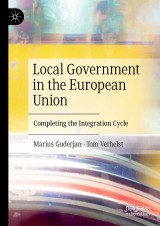Details

Local Government in the European Union
Completing the Integration Cycle|
117,69 € |
|
| Verlag: | Palgrave Macmillan |
| Format: | |
| Veröffentl.: | 30.09.2021 |
| ISBN/EAN: | 9783030743826 |
| Sprache: | englisch |
Dieses eBook enthält ein Wasserzeichen.
Beschreibungen
This book addresses the ‘bigger picture’ of local-European relations and adds a new dimension to existing studies on multilevel governance and the Europeanisation of local government. Drawing from a combination of European integration theories and operational approaches, it introduces the idea of an integration cycle in which local government responds to the top-down impact of the EU internally, horizontally and vertically. This volume presents a wide range of empirical examples to demonstrate how local authorities across Europe have changed their practices, orientation and preferences, and adapted their institutions and organisation. Not only do cities, towns and counties cooperate with each other across borders and through transnational networks and partnerships, but by mobilising formally and informally, local actors participate in and influence European governance and contribute to the future trajectories of European integration, thereby completing the integration cycle.
<div>Chapter 1. Introduction: Studying European Integration of Local Government.- Chapter 2. The Integration Cycle: Theorising European Integration of Local Government.- Chapter 3. The Top-Down Perspective: Legislative and Policy Impact.- Chapter 4. The Internal Perspective: Awareness, Attitudes and Adaptation.- Chapter 5. The Horizontal Perspective: Twinning, Networks and Territorial Cooperation.- Chapter 6. The Formal Bottom-Up Perspective: Constitutional Status and Institutionalised Participation.- Chapter 7. The Informal Bottom-Up Perspective: Mobilisation and Interest Representation.- Chapter 8. Closing the Cycle: The Impact of Formal and Informal Mobilisation.- Chapter 9. Conclusion: Reflections on European Integration of Local Government./</div>
<p><b>Marius Guderjan</b> is a Lecturer and Researcher in British Politics at the Centre for British Studies at the Humboldt-Universität zu Berlin, Germany.</p><p></p><p><b>Tom Verhelst</b> is an Assistant Professor in Local Politics at the Centre for Local Politics at Ghent University, Belgium, and a Postdoctoral Research Fellow in Local Governance at the Department of Political Sciences at Maastricht University, the Netherlands.</p><p></p><p> <br></p><div><br></div><div><br></div><div><br></div>
<p>‘Local government is a key topic for EU scholars. Yet, it has been somewhat under-explored, with the literature on the EU having largely neglected it. This book does much to fill this gap by providing an empirical and theoretical account of the role of local government in the EU. It provides a well informed and very thoughtful account of the different relations between the different elements of European local government’.</p><p>—Neill Nugent, Professor Emeritus of European Politics, Manchester Metropolitan University, UK</p>‘The authors work with the analytical framework of an integration cycle, according to which local government reacts to the impact of EU decisions by adapting its internal organisation and external interactions in order to shape European integration in general and EU policies in particular. Empirically it is shown how complex this cycle is and how its results emerge from an interplay of formal and informal, vertical and horizontal interactions’.</p><p>—Hubert Heinelt, Retired Professor of Public Administration, Public Policy and Local Politics, TU Darmstadt – Institute for Political Science, Germany</p>This book addresses the ‘bigger picture’ of local-European relations and adds a new dimension to existing studies on multilevel governance and the Europeanisation of local government. Drawing from a combination of European integration theories and operational approaches, it introduces the idea of an integration cycle in which local government responds to the top-down impact of the EU internally, horizontally and vertically. This volume presents a wide range of empirical examples to demonstrate how local authorities across Europe have changed their practices, orientation and preferences, and adapted their institutions and organisation. By mobilising formally and informally, they participate in European governance and contribute to the future trajectories of European integration, thereby completing the integration cycle.</p><p><b>Marius Guderjan</b> is a Lecturer and Researcher in British Politics at the Centre for British Studies at the Humboldt-Universität zu Berlin, Germany.</p><p><b>Tom Verhelst</b> is an Assistant Professor in Local Politics at the Centre for Local Politics at Ghent University, Belgium.</p><p></p>
Draws on integration theories and operational approaches to explain the integration of local government into the EU polity Builds an analytical framework for study using macro- and micro-dynamics Posits an integration cycle, in which local government responds to the top-down impact of integration, and thus shapes future integration
‘This book examines whether the EU multi-level system consists of not just of three, but of four levels - i.e. not just the levels of the EU, the Member State governments and the regions, but also one of local governments. To this end, the authors work with the analytical framework of an integration cycle, according to which local government reacts to the impact of EU decisions by adapting its internal organisation and external interactions in order to shape European integration in general and EU policies in particular. Empirically it is shown how complex this cycle is and how its results emerge from an interplay of formal and informal, vertical and horizontal interactions’.<p>—<b>Hubert Heinelt</b>, Retired Professor of Public Administration, Public Policy and Local Politics, TU Darmstadt – Institute for Political Science, Germany</p><p> ‘Local government is a key topic for EU scholars. Yet, it has been somewhat under-explored, with the literature on the EU having largely neglected it. This book does much to fill this gap by providing an empirical and theoretical comparative account of the role of local government in several EU member states. Based on extensive original research, it provides a well informed and very thoughtful account of the different relations between the different elements of European local government’.</p><p>—<b>Neill Nugent</b>, Professor Emeritus of European Politics, Manchester Metropolitan University, UK</p>

















